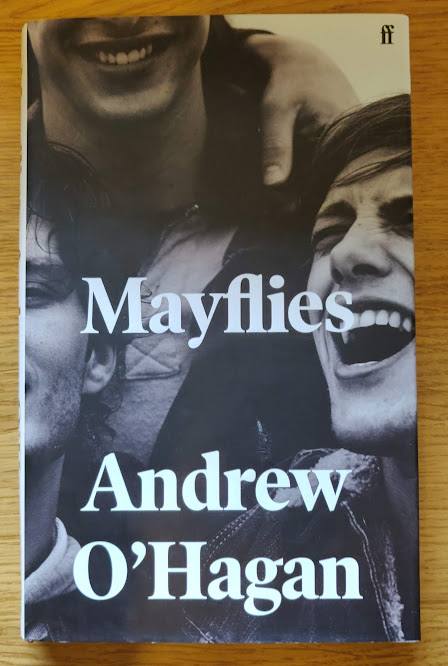Andrew O’Hagan’s latest novel Mayflies describes a friendship between two men, Jimmy and Tully, who met on their council estate in 1980s Ayrshire and remained close until Tully’s death from stomach cancer in his early fifties. The book unfolds in two distinct parts, one in 1986 as young men, the other in 2017 as Tully’s days became numbered. Despite being a long-term subscriber of the London Review of Books, and having read a lot of his non fiction, this was my first time reading O’Hagan’s fiction. However, an interview with O’Hagan confirmed my suspicions about the book: Mayflies is a non fiction novel. O’Hagan has changed the names but the setting and characters all correspond with real people. The incidents described, for the most part, happened as described. The book is dedicated to his lost friend and his wife. Undoubtedly, anything based on reality absorbs a certain amount of fiction in the very act of retelling, but this novel reads more like someone trying to process trauma than fiction.

O”Hagan sets the first half of Mayflies in his home place of 1980’s Ayrshire, in a working class community on the edge of a lost future. Thatcher is name-checked in the first half as is Brexit in the second, but the story is personal, and not in the sense of the personal as political. In the past, O’Hagan has written well about the impact of Thatcherism in Britain. However, in Mayflies, the characters don’t seem shaped in any distinctive sense by the political landscape. Teenagers who are attracted to alternative rock embrace its counter culture politics. Teenagers in 1960s America protested the Vietnam war in much the same way some of my classmates protested the Iraq war around the turn of the century. Although the narrator mentions that Tully delivered food parcels to the homes of mining families, everything about the politics of the novel feels shallow. Any appearance of race or politics demonstrate Tully’s kindness and maturity, his fixed nature that reacted to the circumstances but were not shaped by them. Later in the novel, the narrator has dinner with a vicar who has just returned from the opening of a food bank. While Thatcherist politics have a direct correlation with the need for food banks, this is nothing but background noise, small talk that is inconsequential to the story. The impact the characters’ parents had on the men they become runs deeper and is easier to trace than the national politics.
The characters bond because of chance and circumstance, having been born close to one another, with similar interests and an intelligence that never quite allows them to fit in. In the second half, both characters have made it out – the protagonist as a successful writer and Tully as an English teacher. They stand on the other side of the social divide, with means and options their parents never had. Although this is factual, as this story barely disguises its basis in reality, one could argue that it serves to validate Thatcher. Both characters picked themselves up by their bootstraps and enjoyed the social mobility capitalist society promises to provide.
This “First Big Weekend” trope of the first half of the book has been done to death. Once upon a time, a group of sound lads went out and had a mad one. The End. Without the context of the second half, it reads as another all-male coming of age story described by a man who is feeling past his prime. Every man who has had the privilege of seeing middle age has a similar story to tell. The fact that the preface of the book contains a quote from Yeats – the king of all middle-aged men. – did not bode well. O’Hagan’s prose, while accessible, lacks the hypnotic effect of his Assange book or any of his London Review of Books pieces. O’Hagan becomes Yeats in this novel, and whatever your opinion of Yeats, he was first and foremost zero craic. At most, Mayflies is an essay that fleshes out the Yeats quote.
While O’Hagan wrote the book to pay tribute to his dead friend and their shared time together, what’s most striking is that nothing in their adult lives seems to matter as much as the music they encounter as teens. Tully spends most of his adult life dedicated to music and making music, yet when they travel to Switzerland so that he can end his life on his own terms, he puts on a Joy Division t-shirt. Even Tully’s mother, suffering from Alzheimer’s, remembers nothing of herself or her family but sings the hits from her own era. If we treat Mayflies more like an allegory, the existential issue seems to be less about death and surviving one’s loved ones and more about the fact that regardless of the decades we continue to live through, our internal world remains tethered to the period of our lives when we were on the edge of becoming someone, our initial emergence, and never moves beyond this. Whether anyone does in fact become whoever they wanted to be seems to matter little, in Mayflies at least. O’Hagan writes with more heat about the gig in Manchester than his own outstanding literary achievements or the life he built for himself in London.
I realise that I’m glazing over the fact that the novel is the portrait of a very best friend who was taken quickly and before his time. To anyone normal, this should be and probably is the primary horror of the novel. However, the idea that one can live a long life, which seems to be the aim, and everything pale in insignificance to the first friends, lovers, and music seems like the real horror.